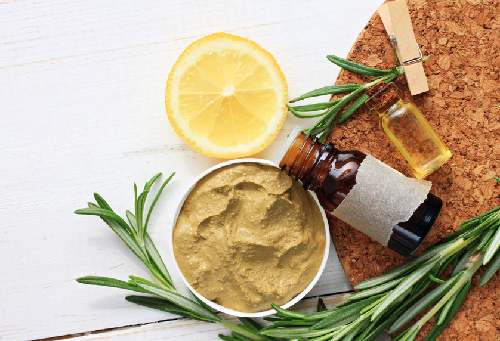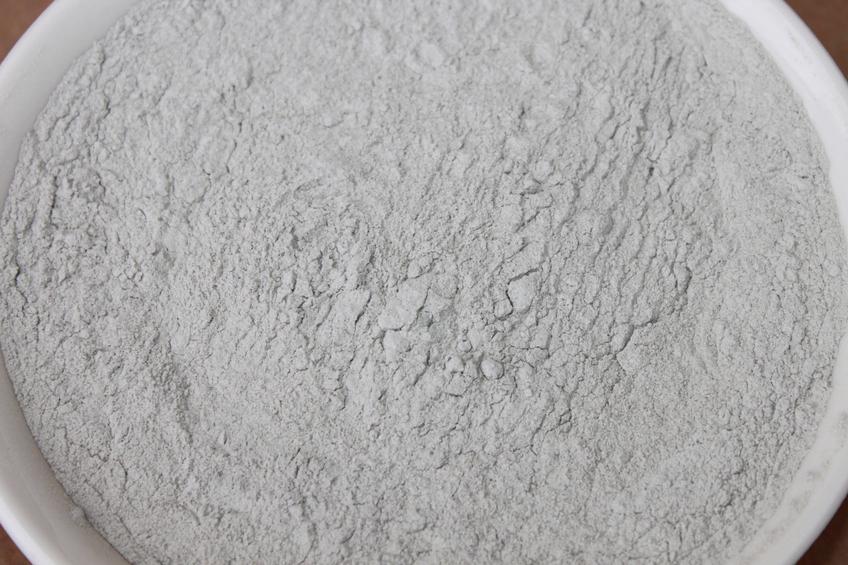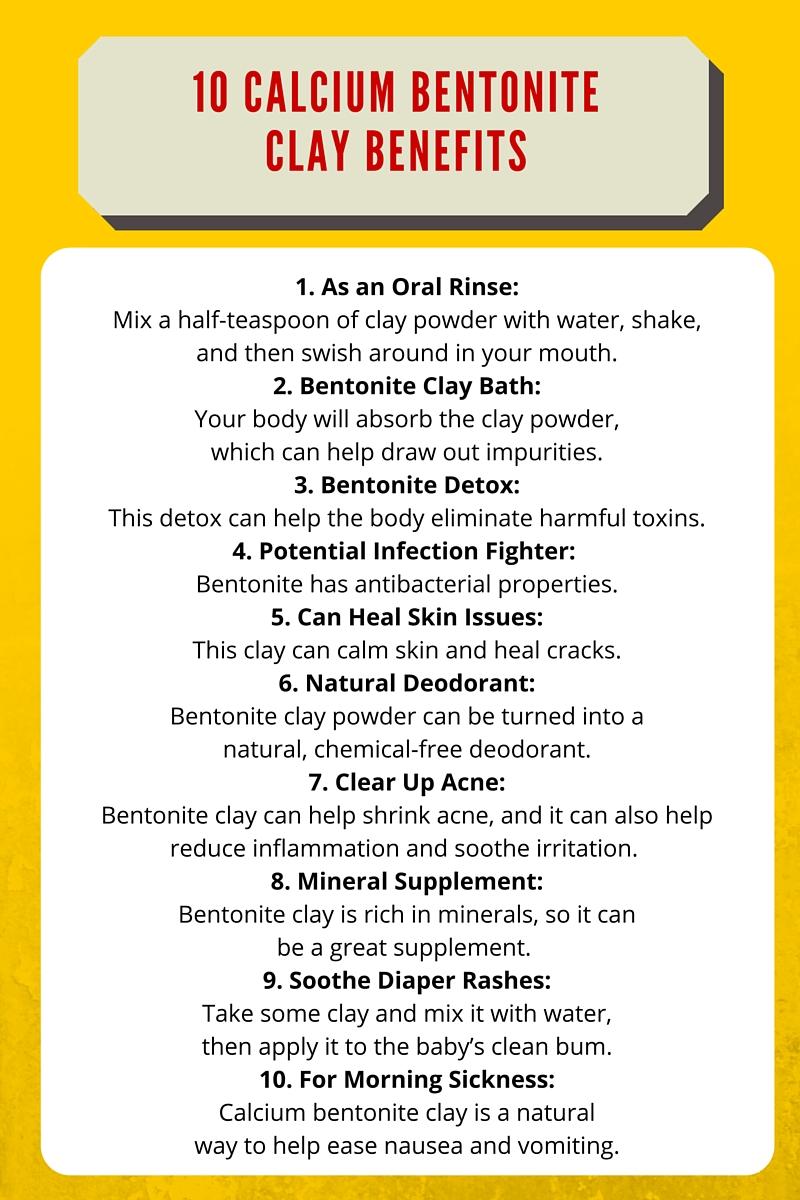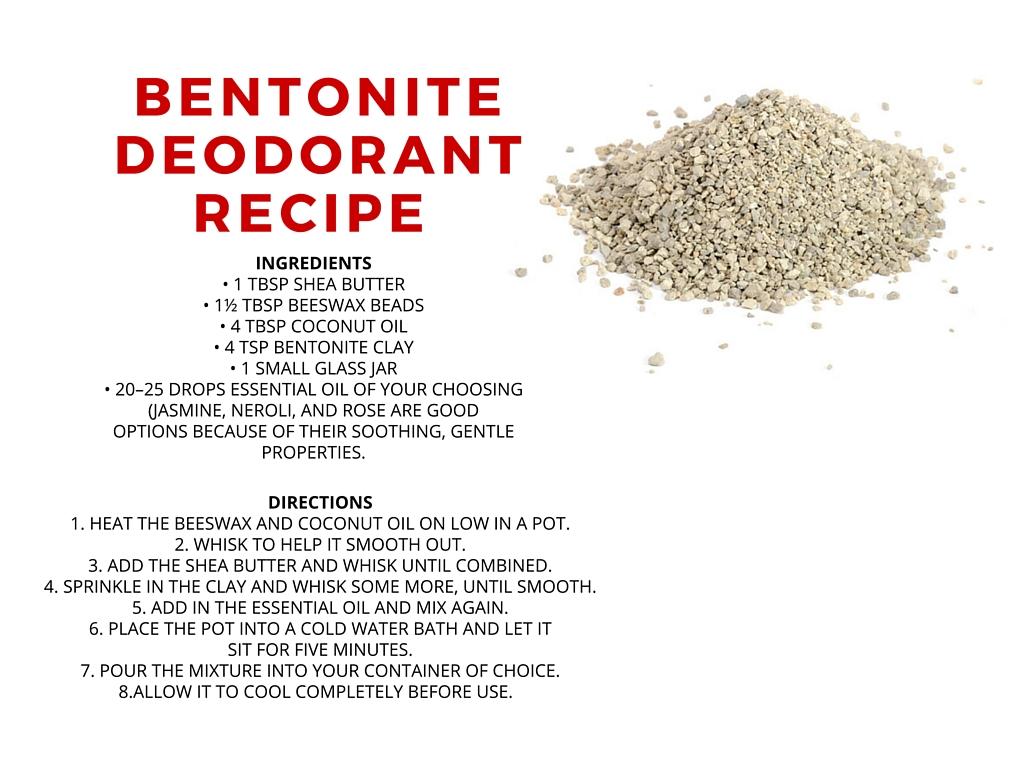 Bentonite clay might revolutionize your beauty and health regimen if it hasn’t already. It’s been growing in popularity recently and for good reason; the number of health benefits. So what is bentonite?
Bentonite clay might revolutionize your beauty and health regimen if it hasn’t already. It’s been growing in popularity recently and for good reason; the number of health benefits. So what is bentonite?
Also called montmorillonite, this natural substance formed by volcanic ash is used to treat an array of conditions.
Some people consider it a healing clay because of its curative and cleansing properties. Bentonite clay is used on the face and body to purify the skin and draw out toxins, but it can also be taken internally to help the body heal.
There are three types of bentonite clay: sodium bentonite, calcium bentonite, and potassium bentonite. Calcium bentonite is the kind used for the body. Sodium bentonite is typically used as a sealant and potassium bentonite is potash.
The health benefits of calcium bentonite clay are primarily associated with its detox and cleansing abilities. It can be taken internally or used externally as a clay mask, mud pack, bath additive or applied to the skin on affected areas to cleanse and pull toxins from the body.
When taken orally and ingested, the health benefits of bentonite clay work to help pull potentially dangerous toxins and heavy metals from your digestive tracts and internal organs. It can help improve gut bacteria, improve immune function and create a safer environment inside your body.
Using clay for detoxification purposes has been done in many cultures over hundreds of years, but is a relatively forgotten practice in modern Western society, though there is a resurgence happening as people look to nature for safe and effective ways to restore the body. There are animals that eat clay and dirt intuitively because they know it will remove poisons from their body.

Bentonite clay may be beneficial because it can aid the body in eliminating toxins, which can, in turn, help reduce inflammation.
Bentonite clay is made from volcanic ash, and is harvested mostly in the U.S., France, and Italy. The largest source of bentonite clay is found in Fort Benton in Wyoming (hence the name). Another name for this clay is Montmorillonite, named after the town in France where the next most abundant source of the clay is found.
How to Use Bentonite Clay
Bentonite clay may be beneficial because it can aid the body in eliminating toxins, which can, in turn, help reduce inflammation. Not only will the clay remove impurities, but it will also deliver much-needed minerals and nutrients to the body, including calcium, magnesium, and sodium.
There are many uses for bentonite clay, and the clay itself can be purchased at health food stores. Look for good quality clay that is meant for internal and external use. Sixteen ounces should run you about $20 give or take, depending on the brand and where it’s purchased.
Detoxifying Effects of Bentonite Clay
Bentonite clay has a number of potential detoxifying health benefits. Some of the potential uses of bentonite clay include face masks to remove toxins and blemishes from skin, heal wounds and potentially pull toxins form the skin in a soak. It can also be taken internally to aid the digestive system, immune function and possibly improve overall organ functionality. Taken orally, it could help:
- Cleanse the liver, colon and skin
- Balance gut bacteria in the digestive tract
- Strengthen the immune system
- Help with nutrient absorption
All of these benefits can translate into treatments for the following conditions:
- Food allergies
- Colitis
- Viral Infection
- Parasites
- Arthritis
- Cataracts
- Diabetic neuropathy
- Diarrhea
- Stomach ulcers
- Acne
- Anemia
Now I’m going to stop short of saying bentonite clay is the fix for all these conditions, but it is something worth looking into if you’re interested in an alternative form of treatment for one. As always, talk to you doctor before trying anything that could have reactions with medications or treatments you’re currently taking.
How Bentonite Clay Works
Bentonite clay’s health benefits are all a result of chemical reactions that occur between it and potentially harmful heavy metals. When it comes into contact with a liquid, bentonite clay produces an electrical charge that bonds to toxins. It is a negative ion that attracts positive ions that ultimately bind together to be pulled away from the affected areas. Because of its negative charge, however, it does not leach away beneficial nutrients, bacteria or chemicals in your boy. Instead it only binds to impurities and other harmful compounds—including heavy metals like mercury and lead—and draws them out of your gut, skin and mouth.
Calcium Bentonite Clay Benefits

1. As an Oral Rinse
Want a natural way to have fresh breath? Use bentonite as an oral rinse every day. Simply mix a half-teaspoon of clay powder with water, shake, and then swish around in your mouth as you would regular mouthwash.
2. Bentonite Clay Bath
Want to remove toxins from your body but you don’t want to take the clay internally? No problem. Have a bath with clay powder in the water. Your body will absorb the clay, which can help draw out impurities. Use two tablespoons per bath, and add it to the tub while the water is running so it has a chance to mix in; you may need to help it along by agitating the water with your hand. For an added benefit, add a few drops of lavender or some other essential oil to make the bath smell good and allow you to enjoy the benefits of aromatherapy as well.
3. Bentonite Detox
Drinking bentonite clay sounds a bit crazy, but it’s effective. Using bentonite powder as a bentonite clay detox can help the body eliminate harmful toxins. When doing a bentonite detox, or simply taking it internally, do not take it two hours before or after medications or supplements. No long-term studies have been done on bentonite, but many alternative healthcare practitioners consider it to be safe.
4. Potential Infection Fighter
A study published in the Journal of Antimicrobial Chemotherapy in 2008 (1) found that some geological minerals, such as bentonite, have antibacterial properties, and that these minerals and clays could provide an alternative method in which to fight off bacterial infections.
5. Can Heal Skin Issues
Do you suffer from dermatitis, eczema, rosacea, or psoriasis? If so, this clay can calm skin, heal cracks, and prevent infections that might be flaring up. You can prepare a bentonite mask compound for your hands (much as you would for your face) and anywhere else your body has skin problems. Leave it on for 20 minutes and then wipe it off with a warm cloth. You can do this a few times a week for more stubborn skin issues.
6. Natural Deodorant
Bentonite clay powder can be turned into a natural, chemical-free deodorant, an option many people are turning to because they don’t want to put aluminum chlorohydrate on their skin, despite its safety and approval by the FDA (2) (though they are monitoring scientific literature for new information). You can make a bentonite deodorant following this recipe. You will need:
- 1 tbsp shea butter
- 1½ tbsp beeswax beads
- 4 tbsp coconut oil
- 4 tsp bentonite clay
- 1 empty deodorant container or small glass jar
- 20–25 drops essential oil of your choosing (jasmine, neroli, and rose are good options because of their soothing, gentle properties)

Heat the beeswax and coconut oil on low in a pot. Whisk to help it smooth out. Add the shea butter and whisk until combined. Sprinkle in the clay and whisk some more, until smooth. Add in the essential oil and mix again. Place the pot into a cold water bath and let it sit there for five minutes. Pour the mixture into your container of choice. Allow it to cool completely before use.
7. Clear Up Acne
A calcium bentonite clay mask just might do the trick in helping acne clear up. Clay is drying so it can help shrink acne, and it can also help reduce inflammation and soothe irritation. And because it has antibacterial properties, bentonite clay can tackle infections that may have developed if the acne is bad enough.
A simple bentonite clay mask can be made with clay and water. Add enough water to make a paste, and then apply it to freshly washed skin. Leave it on for 20 minutes and then gently wipe it off with a warm facecloth. Alternatively, instead of water you could use apple cider vinegar, which has healing properties as well.
8. As a Mineral Supplement
Bentonite clay is rich in minerals, so it can be a great supplement. To take it internally, mix half a teaspoon (or one teaspoon) of clay with water and shake vigorously in a mason jar, then drink immediately. Do this once a day. If you’re unsure, speak with your doctor before doing this to be certain that it’s right for you.
9. Soothe Diaper Rashes
This might sound odd, but you can make an affordable and effective diaper ointment for a baby’s sore bottom when they are suffering the ravages of a painful diaper rash. Take some clay and mix it with water (you want a mild formulation, so avoid using apple cider vinegar here), then apply it to the baby’s clean bum. Allow it to dry before diapering again. Over the course of the day, as you change further diapers and clean the baby’s bottom, the mask will be removed. You can apply this twice a day until the rash calms down. Clay powder can also be used as an effective baby powder instead of talc. Lightly sprinkle some clay onto your baby’s bottom after cleaning and before diapering. Again, if you’re unsure about using any of this on your baby, check with your doctor first.
10. For Morning Sickness
Some women experience morning sickness in one or all of their trimesters; it depends on the individual. Nevertheless, calcium bentonite clay is a natural way to help ease nausea and vomiting, and it’s safe for fetuses and mothers. Drink half a teaspoon of clay in water each morning to reap the benefits. Please also let your doctor know that you are considering this as an option for your morning sickness.
11. Fights toxins in the environment
Virtually no matter where you are or what you’re doing, you’re surrounded by potential toxins—even in your own home. Things like paint, cleaning supplies, office equipment, pesticides, building materials—everyday items—are emitting Volatile Organic Compounds (VOCs). Although you’re likely unaware you’re breathing them in, you are, and it could result in health problems. Bentonite clay may help absorb VOCs and remove them, possibly reducing their impact and your exposure.
12. Helps gut bacteria
When ingested, bentonite clay can have a positive impact on your gut health. It promotes the health and cultivation of helpful gut bacteria while drawing toxins and metals—that can promote bad bacteria—out of the region. The result may be improved nutrient absorption, digestion and a stronger immune system.
13. Relief from digestive issues like IBS, constipation and nausea
Because it may neutralize bacteria and promote improved gut bacteria, bentonite clay may help treat digestive problems. There are a number of digestive conditions it might be useful for, including irritable bowel syndrome (IBS) and constipation, while also potentially battling nausea experienced by pregnant women. It’s expected to produce these results by absorbing rotavirus, which is a primary cause of gastrointestinal troubles.
14. Combats dietary toxins
Dietary toxins are found in a number of foods and are largely unavoidable; however, some of them can damage your health. One of these compounds, in particular, is called aflatoxin. Aflatoxin is a mold-like compound produced by organisms living on a number of food crops, but is most commonly found on peanut butter and cooking oils. It’s possible that aflatoxins can interfere with immune system function, and there is some research that indicates bentonite clay can reduce the damage they may cause.
How to Take Bentonite Clay
Bentonite clay may be most effective when taken orally, but a procedure should be followed when doing so. When taking it orally, it’s best to do so it an empty stomach and at least an hour before taking any other supplements or food. Because of the electric charge and negative ions it features, it’s recommended you don’t use metal to mix or prepare it. Nothing terrible will happen, but it can result in some potency being lost as it may bind to positive ions in metal utensils. Instead use wood, glass or plastic.
- Mix one to two teaspoons in an eight-ounce glass of water and drink.
- Repeat this for three days (drink one glass per day)
- On the fourth day, don’t drink it
- Don’t drink any for four consecutive days (including the first)
- On the fifth day, follow the initial procedure, this time drinking the mixture for four straight days
- After the fourth day, don’t use it again for the next three days.
This process will allow your body to adapt; it should take up to four weeks of repeating those steps. Remember to consume eight to 10 glasses of water per day when you’re taking bentonite clay. It can also be purchased in capsule, powder or gel form.
For external use, like in a bath, use about a quarter of a cup. Add it to bath water for a soak, or use it as a rub or mask.
Read Next:
